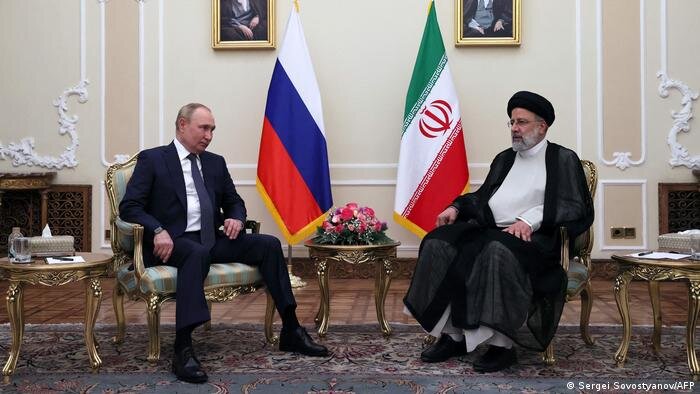Iran and Russia: Moving towards anti-West coalitions

Having a long history of physical, productive, and socio-political interplay, the relationship between Iran and Russia goes back to 1521 when the first envoy was sent to Russia from Iran by Safavid Shah Ismail I to the Tsar Vasili III.
This event marked the first diplomatic contact between the two nations. As time passed, they shared a 2000-km borderline well before the Soviet disintegration in 1991. However, during most of the past two centuries Iran-Russia relations had been uneasy as Russia meddled with Iranian domestic affairs. But the emerging scenario indicates that in spite of not being geographical neighbors the two countries still have their own reasons and intentions to come together. Iran considers Russia not only as a source of arms but also as a diplomatic link to counter the U.S. Russia concentrated on Iran more than the states of Central Asia and Transcaucasia because of Iran being a major player in the region owing to its strategic position in the Persian Gulf. Relationship, however, is slow but steady since they are sailing on the same boat considering the role played by the West against both the nations. Russia’s relations with the West have further deteriorated due to Russo-Ukrainian war.
“In fact, both (Russia and Iran) are willing to perform as strategic and economic partners to one another as both countries are under sanctions by much of the Western world.”Recently, Russia has upgraded its relations with Iran in order to buy more drones because Iran is a leading drone inventor and Russian drones have been destroyed by heavy military equipment supplied by the West to Ukraine in the war. Russian officials have been seen visiting Iran five times in a row in recent times which denotes that there is immense inclination of Russia to take its relationship with Iran forward from partnership to strategic allies. In fact, both are willing to perform as strategic and economic partners to one another as both countries are under sanctions by much of the Western world. Eventually, they have come closer so much that energy cooperation appears to be an important agenda of their bilateral relations. In addition, much of the military weapons are coming from Iran to Russia and in return, Iran also purchases military hardware from Russia. As a result, Russia has shown a degree of willingness to ally with Iran militarily also.
Amid a thaw in Iran-Russia relationship, there has also been criticism of the U.S. to put allegations on Iran for supplying military equipment to Ukraine or Russia. But, on the other hand, Iran in fact has passed a statement to bring peace in two nations, i.e., Ukraine and Russia in order to make Iranian views clear on war without taking side of anyone of them. Both Iran and Russia are constantly making efforts to build up relations on the ground of history to earn good economic relations. Putin has been trying his best to improve Russian image amongst the Iranians. In addition to their trade and cooperation in hydrocarbons, Iran and Russia have also expanded trade ties in many non-energy sectors of the economy, including a large agriculture agreement. They also have the same reason to limit the political influence of the U.S. in Central Asia which they can do by using the SCO platform where Russia is a member while Iran has an observer status. The International North-South Transport Corridor (INSTC) which is the largest multi-billion agreement signed by Russia’s Gazprom with Iran worth billions and is Iran’s new route for Russian supplies.
Yet, they will have to play cautiously since political relations are very much dependent on economic relations and for that they will have to respect each other’s interest separately and also in an entity. The new Iranian President Ebrahim Raisi who was elected in 2021 proposed a draft for 20 years cooperation agreement between the two countries in order to negate the West. There is a potential for robust relations in terms of economy and the political will goes hand in hand through the INSTC which has both the rail and sea routes that link India, Russia and Iran. On a positive note, with 81% hike in business between Iran and Russia it is obvious that both the nations can show an alternative for them to bank upon against the Western sanctions. Russia is foreseeing Iran as a potential trade and military partner as well as an associate targeted with severe sanctions. Iran, on the other hand, has welcomed Putin with the red carpet in order to get political support at both international and regional levels at a time when the U.S. is trying to isolate Iran and also pressurizing its Western allies to do the same.
Russia’s support to Iran in building nuclear power stations, sale of weapons and assisting Tehran with new technologies which were denied by other countries only point to the fact that both countries now try to make a move towards anti-Western coalitions. Finding a way in such a manner that brings both of them on the same footing to tackle the repercussions of the Western sanctions is the need of the hour. This will also create ripples and will captivate the attention of the world to the Russian and Iranian geopolitical aspirations which, in turn, will showcase the importance of the two nations in mainstream global affairs.
* Vaishali Krishna is assistant professor at Centre for Russian and Central Asian Studies School of International Studies, Jawaharlal Nehru University, New Delhi (India).
